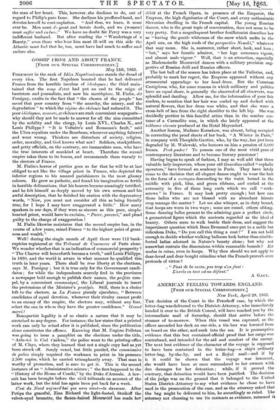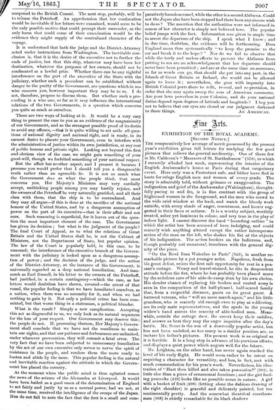New York, April 28, 1 . 863. THE decision of the Court
in the Peterhoff case, by which the letter-bag was delivered to the District-Attorney, who immediately handed it over to the British Consul, will have reached you by the intermediate mail of Saturday, should that arrive before the steamer of to-morrow. When this vessel was captured, as the officer ascended her deck on one side, a tin-box was lowered from on board on the other, and sunk into the sea. It is presumptive evidence that this box contained official proof that her cargo was contraband, and intended for the aid and comfort of the enemy. The next best evidence of the character of the voyage is supposed to have been contained in the letter-bag—a ship's ordinary letter-bag, by-the-by, and not a Rojral mail—and if by it it could be shown that the voyage was innocent, she would have been at once surrendered to her owners with due damages for her detention ; while, if it proved the contrary, that detention would have been justified: The decision of the judge was on the ground that it belonged to the United States District-Attorney to say what evidence he chose to have used in the prosecution of the case, and as the attorney asked that the bag might be delivered to him, he accordingly so ruled. 'The attorney not choosing to use its contents as evidence, returned it
unopened to the British Consul. The next step, probably, will be to release the Peterhoff. An apprehension that her confiscation would be inevitable if her letters were examined, would seem to be the only possible motive that could prompt their surrender, as the only harm that could come of their examination would be the evidence they might supply of the contraband character of the voyage.
It is understood that both the judge and the District-Attorney acted under instructions from Washington. The inevitable con- clusion is, that it is the desire of the executive not to further the ends of justice, but that this ship, whatever may have been her destination, whatever the purposes of her owners, should not be confiscated as a lawful prize. Whether there can be any rightful interference on the part of the executive of the State with the judiciary, whether such a precedent can be established without danger to the purity of the Government, are questions which in no- wise concern you, however important they may be to us. I do not, therefore, propose to discuss them. But whether such a pro- ceeding is a wise one, so far as it may influence the international relations of the two Governments, is a question which concerns you quite as much as ourselves.
There are two ways of looking at it. It would be a very easy thing to present the case to you as an evidence of the magnanimity of our Government, and as the strongest possible proof of its desire to avoid any offence, —that it is quite willing to set aside all ques- tions of national dignity and national right, and is ready, in its earnest desire to placate your Government, even to interfere with the administration of justice within its own jurisdiction, at any cost of public honour and private right. Looking not beyond this first and obvious view of the case, we might gain something of your good-will, though we forfeited something of your national respect.
But the affair has another aspect, and I present it because I presume you would prefer that I should tell you a disagreeable truth rather than an agreeable lie. It is not so much what the Government does as what the people think, that most concerns you. Her Majesty's Ministers may very cordially accept, unthinking people among you may hastily rejoice, and the owners of the Peterhoff be very naturally gratified, and all their class with them, that the ship is to be surrendered. And they may all argue—if this is done at the sacrifice of the national honour of the United States, and by a dangerous assumption of power on the part of its executive—that is their affair and not ours. Such reasoning is superficial, for it leaves out of the ques- tion the most important element of the case. The Government has given its decision ; but what is the judgment of the people? The final Court of Appeal, as to what the relations of Great Britain and the United States shall be, is not the Cabinet of Ministers, not the Department of State, but popular opinion. The law of the Court is popularly held, in this case, to be unsound; the interference of the executive branch of the Govern- ment with the judiciary is looked upon as a dangerous assump- tion of power ; and the decision of the judge, and the action of the District-Attorney, at the instance of the Government, is universally regarded as a deep national humiliation. And inas- much as Earl Russell, in his letter to the owners of the Peterhoff, had justified, in a certain contingency—which the case, as her letters would doubtless have shown, covered—the arrest of that vessel, the popular feeling is that we have humiliated ourselves, as a nation, when there was no necessity for it, and when we had nothing to gain by it. Not only a political crime has been com- mitted, but that worse thing in a statesman, a political blunder.
What is the result ? Simply a new complication. Accepting this act as disgraceful to us, we only look as its natural sequences for the loss of your respect. Our Government may deserve this; the people do not. If, presuming thereon, Her Majesty's Govern- ment shall conclude that we have not the manliness to main- tain our rights, and that our patience and forbearance are unlimited, under whatever provocation, they will commit a fatal error. The very fact that we have been subjected to unnecessary humiliation by the act of our own executive only serves to nerve the spirit of resistance in the people, and renders them the more ready to hasten and abide by the issue. This popular feeling is the natural and inevitable reaction against the attitude in which the Govern- ment has placed the country.
At the moment when the public mind is thus agitated comes the news of the seizure of the Alexandra at Liverpool. It would have been hailed as a good omen of the determination of England to act fairly and justly by us as a neutral power, had we not, at the same time, received the intelligence of the escape of the Japan. Men do not fail to note the fact that the first is a small and corn- paratively harmless vessel, while the other is a second Alabama. Could not the Japan also have been stopped had there been any sincere wish to do so ? The assertion that the authorities were not informed in season of her character is simply not believed here. The popular belief jumps with the fact. Information was given in ample time to arrest the departure of the ship. I speak what I know ; and in due time, doubtless, the evidence will be forthcoming. Does England mean thus systematically "to keep the promise to the ear and break it to the hope ? " Nor do we fail to observe that while the tardy and useless efforts to prevent the Alabama from putting to sea are an acknowledgment that her departure should never have been permitted ; and are at the same time an assurance, as far as words can go, that should she put into any port, in the Islands of Great Britain or Ireland, she would not be allowed again to leave it ; nevertheless, she goes with impunity into British Colonial ports there to refit, re-coal, and re-provision, in order that she may again sweep the seas of American commerce. Are your laws powerless in your Colonies, and do your national duties depend upon degrees of latitude and longitude ? I beg you not to believe that our eyes are closed or our judgment darkened































 Previous page
Previous page